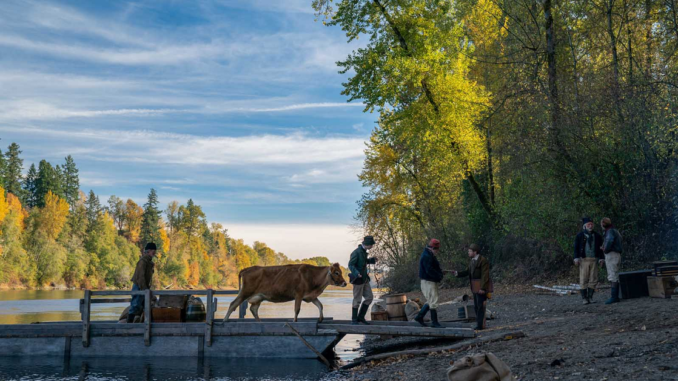
Kelly Reichardt’s First Cow, an offbeat western that’s probably slipped under most people’s radar, strikes me as one of the most odd and rewarding American movies of the year.
A whole range of peculiarities are at the heart of its sly appeal. It’s set in Oregon circa 1843, and its two protagonists are on foot rather than horseback. The eponymous animal is a milk cow rather than the starting point of a great herd of cattle. The men with guns are mostly irascible fur trappers who harass the more peaceable characters, and the key secondary characters include a British aristocrat, a military officer, a Native American potentate and a polyglot assortment of ramshackle adventurers.
The protagonists are “Cookie” Rabinowitz (John Magaro), an itinerant baker, and King-Lu (Orion Lee), an adventurous immigrant and would-be entrepreneur. They first meet when King-Lu. who is fleeing a violent confrontation with “some Russians,” finds temporary shelter with Cookie, who is himself trying to dodge the hostilities of the trappers who employ him as their cook. Later, they will start a business selling Cookie’s biscuits at a nearby trading post.
That makeshift bakery business looms as their chief exploit in First Cow, but the central story (adapted by Reichardt and Jon Raymond from the latter’s fiction) also gives shape to a free-form commentary on “the winning of the West,” the evolution of economics and class distinctions in American society, the sources and varieties of male friendship, and the relations of human beings and the natural world.
A key part of this film’s gentle allure comes from its evocation of dank, green landscapes. And its casual, offhanded bits of human drama are variously immersed in the natural world—grubbing for edibles, improvising shelter, stealing milk from the aristocrat’s prize cow, traversing forested underbrush waterways, etc. In one of the film’s hallmark moments, the filmmakers treat Cookie’s nocturnal visit with the eponymous milk cow as a conversation among equals, even though Cookie does all the talking.
Violent social hierarchies come into view by way of the British aristocrat (Toby Jones) and his companions in and around the trading post. The placid omnipresence of indigenous people serves as a quiet, abiding counterforce to all that—the tribal potentate (Gary Farmer), women and children in the flow of traditional domesticity, a young gallant with whom King-Lu must bargain for a canoe ride to safety, and an elder of indeterminate lineage who performs a dance-like ritual outside the protagonists’ cabin.
First Cow is in some senses a companion piece to another offbeat western of exceptional merit by Reichardt and Raymond—Meek’s Cutoff (2010). That pungently evocative Oregon Trail story foregrounds the roles of women in a wagon train stumbling through the territory’s harsh, brilliant landscape. Part way through, a lone Native American on horseback assumes a paradoxical place in the journey.
Reichardt is a native of Florida, but almost all of her feature films have Oregon or American Northwest settings. Two of the best—Wendy and Lucy (Oregon) and Certain Women (Montana)—might also be viewed as “offbeat westerns,” albeit in modern settings.

Be the first to comment